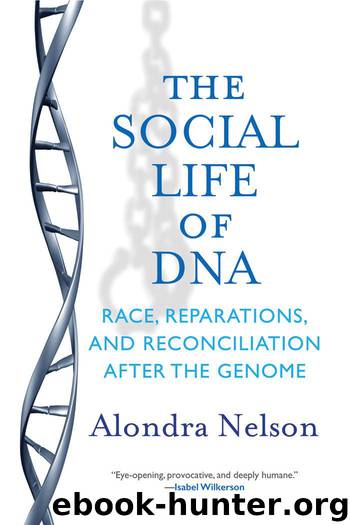The Social Life of DNA: Race, Reparations, and Reconciliation After the Genome by Alondra Nelson

Author:Alondra Nelson
Language: eng
Format: mobi, epub
ISBN: 9780807033029
Publisher: Beacon Press
Published: 2016-01-12T05:00:00+00:00
SIX
Acts of Reparation
They owe us more than they could ever pay. . . . They stole us from our mothers and fathers and took away our names from us.
Every generation of African Americans has its reparations struggle. Collective memory of chattel slavery grows dimmer as the years since Emancipation pass. But the drumbeat for restitution—to amend the intergenerational devastation wrought by racialized human bondage—persists, sounding with renewed intensity in each decade, despite historical amnesia. By the end of the twentieth century, the double helix had become a part of this call for reparations.
The genetics zeitgeist is sweeping. Our DNA hopes are more boundless than we often fully apprehend or dare to admit. In 2004, geneticist Kittles, whose ambitions for ancestry testing have always included racial justice and social transformation, found his company’s techniques engaged in an effort to obtain slavery reparations. African Ancestry’s matrilineal and patrilineal DNA analyses were engaged as twenty-first-century tools that might offer new leverage in the long-waged battle over the repayment of a debt now four centuries overdue.
This novel reparations strategy was born out of a collaboration between Kittles’s African Ancestry company and an African American lawyer named Deadria Farmer-Paellmann. The two met as graduate students at George Washington University in the late 1990s. Kittles was pursuing a doctoral degree in molecular biology; Farmer-Paellmann was working toward a master’s degree in political management and lobbying. Soon to be known as the “Rosa Parks of the reparations litigation movement,” Farmer-Paellmann would conceive a legal plan for restitution for slave descendants that highlighted the connection between inheritance and genealogy and employed DNA to draw these links. The introduction of plaintiffs’ genetic-ancestry-testing results as evidence in Farmer-Paellmann v. FleetBoston was a strategy that became necessary as the case winded its way from lower to higher courts.
Yet this maneuver was also consistent with the growing utility of genetics across contemporary society—the social life of DNA. Indeed, the use of DNA evidence in this case had two prior, necessary touchstones: The first, discussed previously, was the use of genetics, at the end of the twentieth century, in an array of efforts to rectify past injury to social groups and communities. Forensic inquiries in post-junta Argentina, post-apartheid South Africa, and elsewhere married genetic technology and justice claims and were carried out under the banner of international human rights frameworks that would be adopted by reparations activists.
In the United States, there was also growing awareness of the successes of the Innocence Project, a nonprofit legal-advocacy organization established in 1992 that uses DNA evidence to liberate wrongfully convicted persons, including many African Americans. These high-profile exonerations played a role in alleviating blacks’ apprehension about genetic science. As Pat, the genealogist introduced in an earlier chapter, who had worked as an analyst in a crime lab, would say to me: “I’m not question[ing] about DNA. . . . Given my experiences, there is no reason to doubt the technology.” Pat articulated what many African Americans expressed to me about the promise of DNA to set black people free—literally and figuratively.
Download
The Social Life of DNA: Race, Reparations, and Reconciliation After the Genome by Alondra Nelson.epub
This site does not store any files on its server. We only index and link to content provided by other sites. Please contact the content providers to delete copyright contents if any and email us, we'll remove relevant links or contents immediately.
Enlightenment Now: The Case for Reason, Science, Humanism, and Progress by Steven Pinker(7306)
A Journey Through Charms and Defence Against the Dark Arts (Harry Potter: A Journey Through…) by Pottermore Publishing(4811)
The Immortal Life of Henrietta Lacks by Rebecca Skloot(4581)
A Journey Through Divination and Astronomy by Publishing Pottermore(4379)
Elon Musk by Ashlee Vance(4122)
Origin Story: A Big History of Everything by David Christian(3687)
COSMOS by Carl Sagan(3618)
Alchemy and Alchemists by C. J. S. Thompson(3516)
Bad Pharma by Ben Goldacre(3422)
Enlightenment Now by Steven Pinker(3367)
Shadow of Night by Deborah Harkness(3361)
Inferior by Angela Saini(3311)
A Mind For Numbers: How to Excel at Math and Science (Even If You Flunked Algebra) by Barbara Oakley(3302)
Origin Story by David Christian(3195)
The Code Book by Simon Singh(3181)
Signature in the Cell: DNA and the Evidence for Intelligent Design by Stephen C. Meyer(3132)
The Elements by Theodore Gray(3051)
A Brief History of Time by Stephen Hawking(3022)
A Journey Through Potions and Herbology (A Journey Through…) by Pottermore Publishing(2851)
